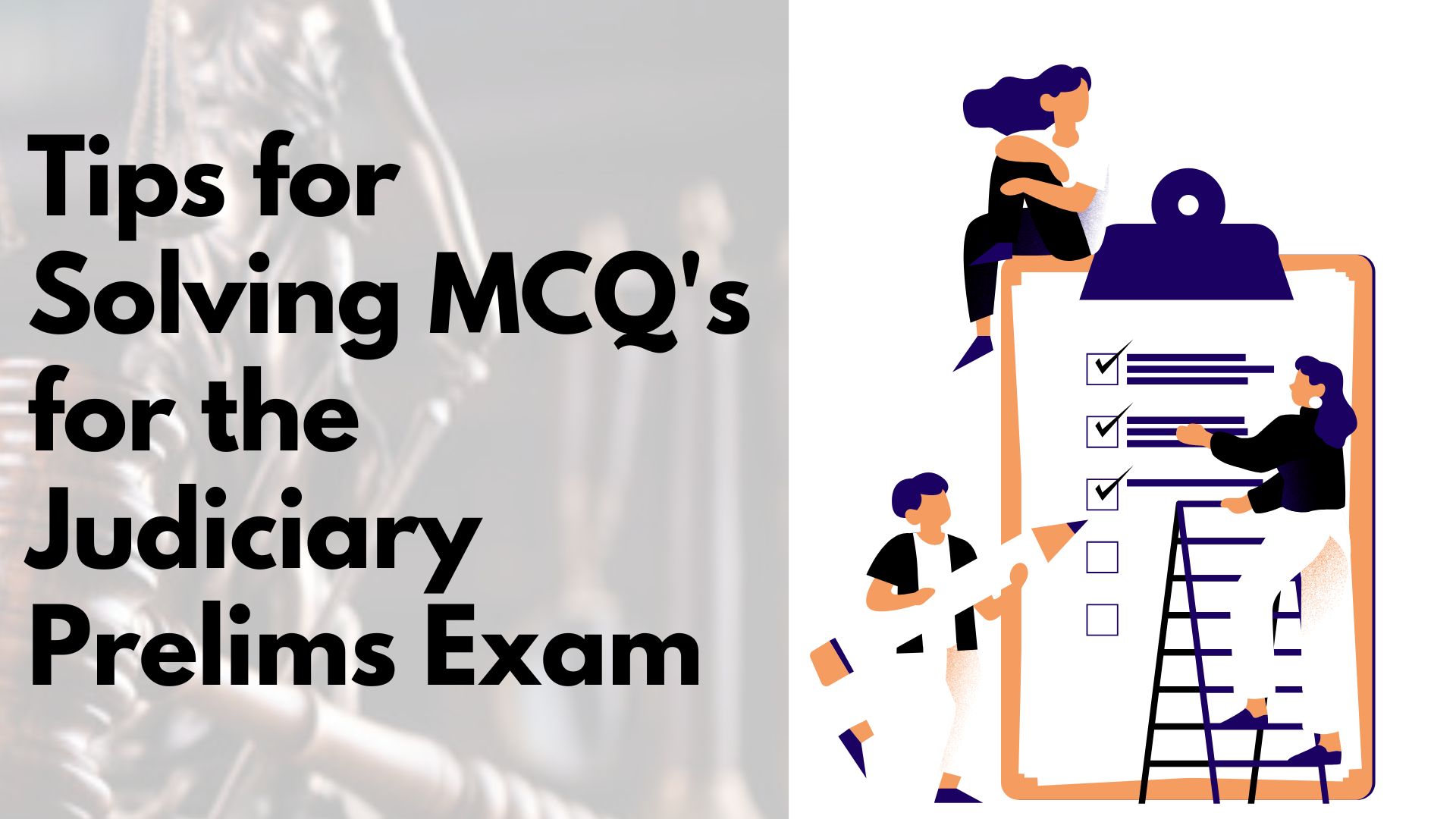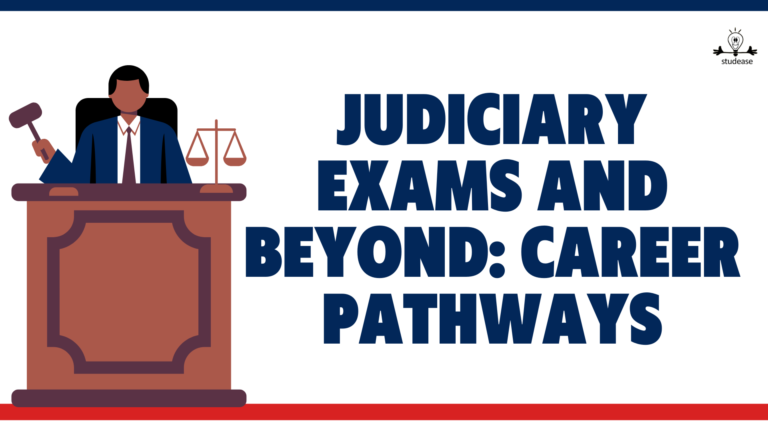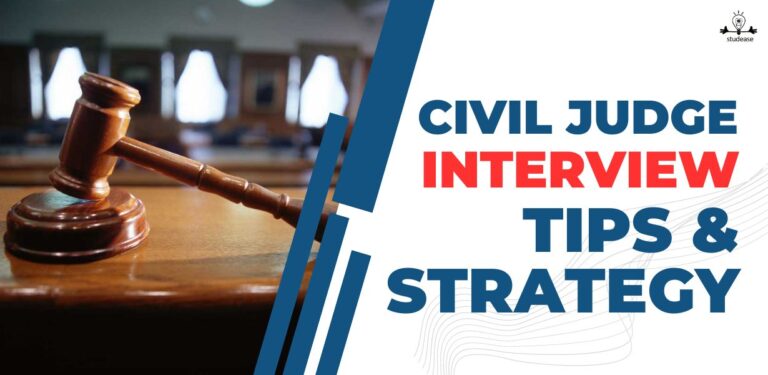Tips for Solving MCQ’s for the Judiciary Prelims Exam: Expert Advice

Multiple Choice Questions (MCQs) are a popular format for many competitive exams, including the Judiciary Prelims Exam. However, they can be tricky to navigate, and many candidates struggle to score well in this section.
In this post, we will provide you with some valuable tips to help you solve MCQs more effectively and increase your chances of success in the Judiciary Prelims Exam.

First and foremost, it’s crucial to understand the format of MCQs.
These questions consist of a stem, which is the main question, and several options as answers. Your task is to choose the correct answer from the given options.
It’s essential to read the question carefully and understand what is being asked before attempting to answer.
Often, MCQs have options that are very similar, making it challenging to identify the correct answer. Therefore, it’s crucial to pay close attention to the details and eliminate the incorrect options systematically.
To excel in the Judiciary Prelims Exam, you must be familiar with the syllabus and exam pattern.
Additionally, practicing mock tests and previous year’s question papers can help you get a better idea of the exam pattern and increase your speed and accuracy in solving MCQs.
Page Contents
Understanding the Exam Pattern and Syllabus
To crack the Judiciary Prelims Exam, it is important to have a clear understanding of the exam pattern and syllabus. This will help you to prepare a study plan and focus on the important topics.
Dissecting the Judiciary Prelims Structure
The Judiciary Prelims Exam is a multiple-choice question (MCQ) based exam that consists of two papers – Paper 1 and Paper 2.
Few states cover both GK and law in 1 paper but for few other states like Uttarakhand, there is a division of Paper 1 and Paper 2 in the same Question Paper.
Paper 1 includes questions on General Knowledge and Paper 2 includes questions on Law subjects.
Now, let’s take a look at the syllabus of the Judiciary Prelims Exam.
The syllabus includes questions from various law subjects, such as the Constitution of India, Indian Penal Code, Civil Procedure Code, Criminal Procedure Code, and Indian Evidence Act.
To score well in the exam, you must have a good understanding of these law subjects.
You can prepare for the exam by referring to standard books and study materials. You can also take online mock tests to assess your preparation level and identify your strengths and weaknesses.
Mastering MCQ Techniques

To excel in the Judiciary Prelims Exam, you need to master the art of solving Multiple Choice Questions (MCQs). Here are some tips to help you improve your MCQ solving skills:
Understanding the Art of Elimination
One of the most effective ways to solve MCQs is to eliminate the wrong options.
Read the question carefully and try to eliminate the options that are clearly incorrect. This will increase your chances of selecting the correct answer.
Solve Maximum MCQ’s
Attempt to solve as many MCQs as possible during your preparation. This will help you to identify the pattern of the exam and improve your speed and accuracy.
Time Management
Time management is crucial in the Judiciary Prelims Exam.
You have to solve 100 MCQs in 2 hours, which means you have only 1.2 minutes to solve each question. Therefore, it is important to manage your time wisely.
Also, accuracy is equally important as negative marking is applicable in the exam. (Pattern is different for few States)
Mark Keywords in Bare Act
The Judiciary Prelims Exam requires you to have a good understanding of the Indian legal system.
It is important to mark the keywords in the Bare Act while preparing. This will help you to quickly identify the correct answer.
Leave the Doubtful Ones
If you are not sure about the answer to a particular question, it is better to leave it and move on to the next one. Spending too much time on a single question can result in wasting precious time.
Attempt in Rounds
It is advisable to attempt the MCQs in rounds.
In the first round, attempt the questions that you are sure about. In the second round, attempt the questions that you have some idea about. In the third round, attempt the questions that you are unsure about.
Mark the Final Ones in OMR Sheet
After attempting all the questions, make sure to mark the final answers in the OMR sheet correctly. Double-check the answers before marking them on the OMR sheet.
Practice Through Mock Tests and Previous Papers
Solving MCQs requires a lot of practice, and the best way to do that is by solving mock tests and previous year question papers. This will help you understand the exam pattern, the type of questions asked, and the time required to solve them.
Here are some tips on how to practice through mock tests and previous papers:
Solving Mock Tests Regularly
Mock tests are a great way to evaluate your performance and identify your strengths and weaknesses.
It is recommended to solve at least one mock test every week. This will help you get used to the exam pattern and improve your speed and accuracy.
While solving mock tests, try to simulate the exam environment as closely as possible.
Sit in a quiet room, without any distractions, and set a timer for the same duration as the actual exam. This will help you get used to the pressure and time constraints of the exam.
After solving the mock test, analyze your performance and identify the areas where you need to improve. This will help you focus your preparation on the areas that matter the most.
Analyzing Previous Year Question Papers
Previous year question papers are a treasure of information. They give you an idea of the type of questions asked in the exam and the difficulty level of the exam.
Analyzing previous year question papers can help you identify the important topics and the areas where you need to focus your preparation.
While analyzing previous year question papers, try to identify the patterns and the trends. This will help you understand the exam pattern and the type of questions asked.
Also, try to solve the questions without looking at the answer key. This will help you get used to the exam environment and improve your confidence.
Negative marking is a crucial factor that needs to be considered while attempting MCQs in the Judiciary Prelims Exam. It can significantly impact your overall score, and therefore, it is essential to have a strategy in place to navigate negative marking.
Firstly, ensure that you are familiar with the negative marking scheme of the exam. This will help you understand how much marks will be deducted for each incorrect answer. Once you know this, you can strategize accordingly.
One effective strategy is to attempt only those questions that you are confident about. This will reduce the chances of getting negative marks. You can then move on to the more challenging questions and attempt them if you have time left.
It is also essential to read the questions carefully and understand what is being asked. Sometimes, the answer may be hidden in the question itself.
It is crucial to be mentally prepared for negative marking. Don’t let the fear of negative marking affect your performance. Stay calm and focused, and attempt the questions to the best of your ability.
Effective Study Techniques

Preparing for the Judiciary Prelims Exam requires a solid study plan and effective preparation techniques. In this section, we will discuss some effective study techniques to help you ace the MCQs for Judicial Services Exam.
Creating a Study Plan
Creating a study plan is the first and foremost step towards effective preparation. A well-structured study plan will help you manage your time effectively and ensure that you cover all the important topics. Here are some tips to create an effective study plan:
- Start early: Begin your preparation at least 3-4 months before the exam date.
- Analyze the syllabus: Go through the syllabus thoroughly and make a list of all the topics that need to be covered.
- Prioritize topics: Prioritize the topics based on their weightage and your comfort level.
- Allocate time: Allocate time for each topic based on its importance and difficulty level.
- Stick to the plan: Follow the plan strictly and revise regularly.
Note-Making and Revision Strategies
Making notes and revising regularly are crucial for effective preparation. Here are some tips to help you make effective notes and revise efficiently:
- Use short notes: Make short notes of important points and concepts.
- Use diagrams and flowcharts: Use diagrams and flowcharts to visualize complex concepts.
- Revise regularly: Revise your notes regularly to ensure that you retain the information.
- Practice previous year Papers: Solve previous year papers to get an idea of the exam pattern and difficulty level.
- Use study materials wisely: Use study materials from reliable sources.
State-Specific Preparation Strategies
Studying for the Judiciary Prelims Exam can be difficult, particularly when dealing with questions specific to a particular state. Here are some strategies that can help you prepare for state-specific questions in the exam.
Adapting to Different State Judiciary Patterns
Each state has its own judiciary pattern. It is essential to understand the pattern of the state you are appearing for the exam. For example, the Delhi judiciary pattern is different from that of Uttar Pradesh. Therefore, it is crucial to adapt to the specific state pattern to score well in the exam.
One way to adapt is to solve previous year question papers of the respective state. This will give you an idea of the type of questions asked and the pattern followed.
Another way is to take mock tests designed specifically for the state you are appearing for. This will help you get familiar with the pattern and the difficulty level of the questions.
Studying State-Specific Laws and Provisions
To excel in state-specific questions, you must study the state-specific laws and provisions thoroughly.
You can also refer to state-specific books and study materials to get a better understanding of the laws and provisions.







